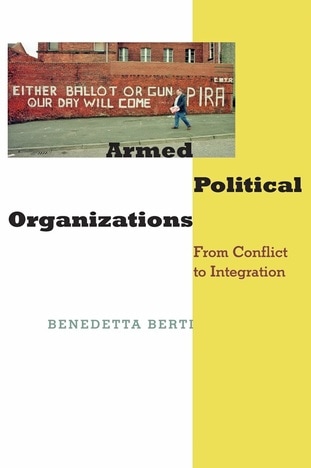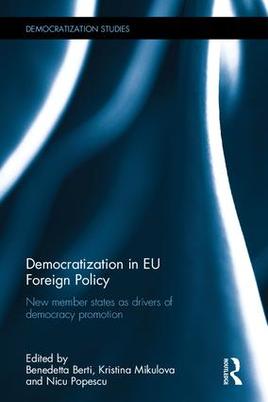Books

|
La fine del Terrorismo: oltre l'ISIS e lo Stato di Emergenza
(Mondadori January 2017) In Italian: The End of Terrorism. Beyond ISIS and the State of Emergency Selected Book Reviews/Interviews: Sul Romanzo, February , 2017 The US-Italy Global Affairs Forum, February 2017 Libero, February , 2017 Quotidiano Nazionale, February, 2017 Vanity Fair, March 2017 Robinson, La Repubblica, March 2017 DLui, La Repubblica, March 2017 Formiche Magazine, March 2017 Corriere della Sera, March 2017 La Gazzetta del Mezzogiorno, March 2017 IL CAFFE' DI RAI UNO, March, 2017 RAI NEWS 24, March 2017 TG5, March 2017 Il Tempo, March 2017 |

Armed Political Organizations: From Conflict to Integration (Johns Hopkins University Press, 2013)
"Armed Political Organizations tackles the vital but neglected topic of armed groups' participation in the political process. By focusing on a mix of internal organizational, political, and structural factors, Berti offers an informed and compelling explanation of the behavior of hybrid groups and counters the flawed argument that political participation necessarily moderates a group's behavior."
-Daniel L. Byman, Georgetown University
"This is an important and timely overview of terrorist groups and their attempts to become actors that are engaged in the democratic process, which highlights the difficulties and tradeoffs that terrorists have faced and shows how they-and their enemies-have responded. Benedetta Berti deserves huge credit for producing such a comprehensive and brilliant analysis."
-Peter Neumann, King's College London
"Berti offers an in-depth analysis of the political strategies of major non-state armed groups like Hamas and Hezbollah, filling a gap in how these actors are understood. Her analysis has important real-world policy implications. This is an important book."
-Richard Shultz, The Fletcher School, Tufts University
"Armed Political Organizations is a fascinating, intelligent read providing clear and coherent analysis of a global problem facing nations around the globe. Berti's research puts a face on terrorists and terrorist organizations as they struggle for a respectable place at the table and a voice for their cause."
-Gershon Baskin, Israel Palestine Center for Research and Information
"Berti's intricate research reveals the history and institutional components of each group beyond what we have come to accept about each."
-Heath Brown - Huffington Post
"The book is a welcome addition to the literature, offering both commendable policy prescriptions and a framework on which other scholars may build."
-Choice
Named one of the Best Political Science Books in 2013 by The Huffington Post
"Armed Political Organizations tackles the vital but neglected topic of armed groups' participation in the political process. By focusing on a mix of internal organizational, political, and structural factors, Berti offers an informed and compelling explanation of the behavior of hybrid groups and counters the flawed argument that political participation necessarily moderates a group's behavior."
-Daniel L. Byman, Georgetown University
"This is an important and timely overview of terrorist groups and their attempts to become actors that are engaged in the democratic process, which highlights the difficulties and tradeoffs that terrorists have faced and shows how they-and their enemies-have responded. Benedetta Berti deserves huge credit for producing such a comprehensive and brilliant analysis."
-Peter Neumann, King's College London
"Berti offers an in-depth analysis of the political strategies of major non-state armed groups like Hamas and Hezbollah, filling a gap in how these actors are understood. Her analysis has important real-world policy implications. This is an important book."
-Richard Shultz, The Fletcher School, Tufts University
"Armed Political Organizations is a fascinating, intelligent read providing clear and coherent analysis of a global problem facing nations around the globe. Berti's research puts a face on terrorists and terrorist organizations as they struggle for a respectable place at the table and a voice for their cause."
-Gershon Baskin, Israel Palestine Center for Research and Information
"Berti's intricate research reveals the history and institutional components of each group beyond what we have come to accept about each."
-Heath Brown - Huffington Post
"The book is a welcome addition to the literature, offering both commendable policy prescriptions and a framework on which other scholars may build."
-Choice
Named one of the Best Political Science Books in 2013 by The Huffington Post

Democratization in EU Foreign Policy New member states as drivers of democracy promotion, with Kristina Mikulova and Nicu Popescu (Routledge, October 2015)
"This volume, skillfully assembled and edited by three talented members of the rising generation of foreign policy scholars closely attuned to emerging trends in Europe’s relations with the world, is a valuable effort (...) [A] work that not only helps us understand what Central and Eastern Europe is bringing to the domain of international democracy support but also helps clarify the challenges facing that domain more broadly."
-Thomas Carothers, Vice President for Studies, Carnegie Endowment for International Peace
"This book is timely and useful. (...) I would like to commend the authors for their efforts, which will certainly help students, scholars and all those who are interested in our part of Europe and this particular part of our history to deepen their understanding."
-Miroslav Lajčák, Deputy Prime Minister Minister and Minister of Foreign and European Affairs of the Slovak Republic
"This volume, skillfully assembled and edited by three talented members of the rising generation of foreign policy scholars closely attuned to emerging trends in Europe’s relations with the world, is a valuable effort (...) [A] work that not only helps us understand what Central and Eastern Europe is bringing to the domain of international democracy support but also helps clarify the challenges facing that domain more broadly."
-Thomas Carothers, Vice President for Studies, Carnegie Endowment for International Peace
"This book is timely and useful. (...) I would like to commend the authors for their efforts, which will certainly help students, scholars and all those who are interested in our part of Europe and this particular part of our history to deepen their understanding."
-Miroslav Lajčák, Deputy Prime Minister Minister and Minister of Foreign and European Affairs of the Slovak Republic

Hezbollah and Hamas: A Comparative Study, with Joshua Gleis, PhD (Johns Hopkins University Press, September 2012)
"Solid analyses of these two Islamist national resistance movements, both of which—notably Hezbollah—demonstrate a kind of strength that is lacking in more secular organizations and constitutes a new kind of challenge to Israel."
— Choice
"While Hamas and Hizbullah have vastly different origins, they share a common adversary: Israel. As the groups become increasingly relevant to US national security, the authors provide a thorough overview of their histories, ideologies, tactics and futures—combining scholarship and primary sources in their analysis."
— Survival
"An essential read for policymakers to help them understand not only how these organizations are structured but also how they operate and the ideas that animate them."
— William Martel, The Fletcher School, Tufts University
"Solid analyses of these two Islamist national resistance movements, both of which—notably Hezbollah—demonstrate a kind of strength that is lacking in more secular organizations and constitutes a new kind of challenge to Israel."
— Choice
"While Hamas and Hizbullah have vastly different origins, they share a common adversary: Israel. As the groups become increasingly relevant to US national security, the authors provide a thorough overview of their histories, ideologies, tactics and futures—combining scholarship and primary sources in their analysis."
— Survival
"An essential read for policymakers to help them understand not only how these organizations are structured but also how they operate and the ideas that animate them."
— William Martel, The Fletcher School, Tufts University
